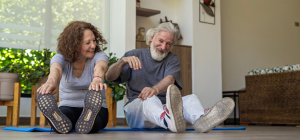Act Now, Age Better

Published on 12 May 2025 09:55 AM
New research by Age UK shows that 78% of midlifers (adults aged between 50 – 65) in the East Midlands - worry about staying healthy as they age.
- Simple steps in our 50s and 60s can lead to major benefits.
- Age UK’s new campaign ‘Act Now, Age Better’ hopes to start a national conversation about how becoming more physically active in our 50s and 60s can ensure a happier, heathier and more independent later life.
New research by Age UK released today reveals that 78% of adults aged between 50–65 in the East Midlands worry about staying healthy as they age, and 74% worry about losing their independence as they age.
When asked how they feel about how physically active they are, 53% said they felt that they don’t do enough or don’t do any physical activity.
While many adults are taking positive steps to age better, misconceptions and barriers to participation in physical activities are holding others back, threatening long-term health outcomes.
Today Age UK Derby and Derbyshire launches its new preventative campaign ‘Act Now, Age Better’, which hopes to start a national conversation about how becoming more physically active in midlife can ensure a happier, heathier, more independent later life.
The Knowledge Gap
Alarmingly, the analysis shows that over half (54%) of adults aged 50-65 equivalent to 7.6 million in the UK substantially underestimated (by 20% or more) the recommended weekly guidelines for physical activity, which include at least 150 minutes of moderate-intensity exercise or 75 minutes of vigorous-intensity exercise, aiming to combine this with muscle-strengthening activities twice a week.
This lack of awareness could lead to missed opportunities for preventative health benefits, such as reducing the risk of chronic diseases, improving mobility, and fostering good mental health.
With an ageing population everyone is living longer but not necessarily living longer in good health. With the right choices in midlife, we can help ourselves to maintain a healthier later life. Simple steps in our 50s and 60s can lead to major benefits down the road.
Jo Briggs, Falls Prevention Service Manager for Live Stronger for Longer of Age UK Derby and Derbyshire said:
“Live Stronger for Longer supports people to regain strength and balance to maintain independent living into later life. The ageing process starts much earlier in our life’s than we think. Strength and balance skills decrease which can lead to falls and the inability to do daily tasks. Age UK have launched Act Now, Age Better to support healthy ageing from a younger age. Research shows “50-65 year olds substantially underestimated the recommended weekly guidelines for physical activity, which include at least 150 minutes of moderate-intensity exercise or 75 minutes of vigorous-intensity exercise, aiming to combine this with muscle-strengthening activities twice a week.”
Age UK Derby and Derbyshires Live Stronger for Longer service which is commissioned by Derbyshire County Council encourages daily activity by incorporating strength and balance exercises into daily routines. To find out more about Act Now, Age Better …………..and LSFL……………….”
Encouraging Trends
Despite this knowledge gap, nationally there are encouraging signs of progress. Of the 30% of people who increased their physical activity in the past year, 63%, equivalent to 2.7 million, did this for their physical health:
- 54% for mental health benefits
- 50% to lose weight
- 46% for better mobility
- 40% to enhance their chances of ageing well
These statistics highlight a growing awareness of the importance of staying active, particularly in promoting long-term health and independence.
Barriers to Physical Activity
However, barriers persist for many in this age group. Women, people on lower incomes and those with disabilities are less likely to say they are active enough and were more likely to say they felt discouraged from being physically active.
Age UK’s national polling shows the common challenges include:
- Health issues (22%) preventing participation. Out of those, 26% were women compared to 18% of men, and 12% of those living comfortably on their present income, compared to 47% of those finding it very difficult to live on their current income.
- Feeling unfit (19%). Out of those 22% were women, compared to 17% of men, 27% had a disability, compared to 14% without, and 12% of those living comfortably on their present income, compared to 28% of those finding it very difficult to live on their current income.
- Fear of injury (13%). Out of those 18% had a disability compared to 10% without, and 8% of those were living comfortably on their present income, compared to 27% of those finding it very difficult to live on their current income.
- Lack of time (18%). Out of those 25% of Black people, compared with 24% of Asian people, and 17% of White people.
- Cost concerns (11%). Out of those 13% were women, compared to 9% of men., 14% had a disability, compared to 9% without, and 1% of those living comfortably on their present income, compared to 23% of those finding it very difficult to live on their current income.
- Embarrassment (9%). Out of those 11% were women, and 7% were men, 16% were LGBT+ and 9% of others. 12% of people had disabilities and 7% of people without. 6% of those were living comfortably on their present income and 14% of those finding it very difficult to live on their current income.
- Or intimidation (6%). Out of those 14% were LGBT+ compared with 6% of others. 9% of people had a disability compared to 5% without. And 11% were carers compared to 5% of non-carers.
Sadly, 4% of respondents believe it’s too late to make a difference and 5% say they’re too old, underscoring the need for messaging that emphasises the lifelong benefits of starting or maintaining an active lifestyle.
Call to Action
Age UK calls on all adults aged 50 and older to start preparing for their health in later life as they would prepare financially with a pension. The message is clear: It’s never too late to make meaningful changes. By incorporating regular physical activity into daily routines, individuals can secure a healthier, happier, and more independent future.
Age UK has worked with lifestyle medicine doctor, personal trainer and health coach, Dr Hussain Al-Zubaidi, to create a new leaflet showing some simple, effective ways to add more activity to our lives. For more information, as well as advice and inspiration from Dr Hussain’s informative leaflet to healthier ageing, please visit: www.ageuk.org.uk/actnow.
The Act Now, Age Better campaign raises vital awareness of the importance of making small changes in midlife to help improve the quality of our later years.
The campaign is also being supported by Age UK’s partner Dunelm, the UK's leading homewares retailer, by helping Age UK start the conversation with their customers about ageing, both in-store and online, showing that home is the perfect place to start getting active.
To find out more about our Live Stronger for Longer service, go to: https://www.ageuk.org.uk/derbyandderbyshire/our-services/exercise/live-stronger-for-longer/
The NHS has a useful page on Harnessing the benefits of physical activity too: https://www.england.nhs.uk/ourwork/public-health/harnessing-the-benefits-of-physical-activity/
Useful information
